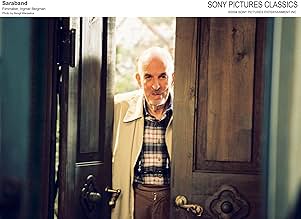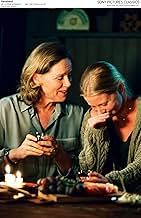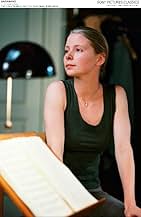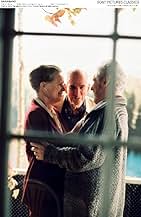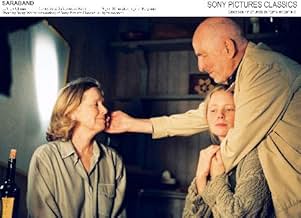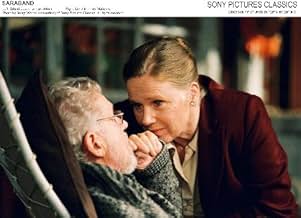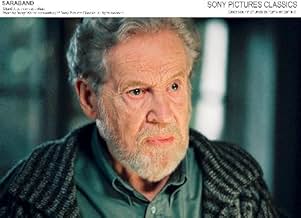Unos treinta años después de divorciarse de Johan, Marianne decide ir a la casa de verano de su exmarido para hacerle una visita. Al llegar, se encuentra en medio de un drama familiar entre ... Leer todoUnos treinta años después de divorciarse de Johan, Marianne decide ir a la casa de verano de su exmarido para hacerle una visita. Al llegar, se encuentra en medio de un drama familiar entre el hijo de Johan, de otro matrimonio, y su nieta.Unos treinta años después de divorciarse de Johan, Marianne decide ir a la casa de verano de su exmarido para hacerle una visita. Al llegar, se encuentra en medio de un drama familiar entre el hijo de Johan, de otro matrimonio, y su nieta.
- Dirección
- Guión
- Reparto principal
- Premios
- 3 premios y 3 nominaciones en total
Reseñas destacadas
Now, over 30 years later, I am in my living room once more watching Johan and Marianne. Only this time I don't need subtitles, as I have since learnt Swedish. :-)
Bergman weaves a tale of vindictive dependence and of a young girl's decision to finally make her own way in life - despite some very powerful forces preventing such a move.
Marianne decides to seek out Johan, meets him and becomes involved in the tug of war over his grand-daughter's future with the girl's father, Johan's depressed son Henrik (wonderfully played by Börje Ahlstedt).
A quiet, intensive film. With an important, pivotal roll for the grand-daughter Karin played by Julia Dufvenius.
Bergman should be proud of this. It's a fine epilogue to a marvelous career in cinema and story-telling.
Bravo!
It may be too easy to compare and contrast this film and the series. But it is of interest if only for curiosity sake. There is something of note that revealed to one how the actual cinematography can evolve properly or at least in a fashion that is not off-putting. This time around (unlike Sven Nykvist's perfect work on 'Marriage', a kind of pre-Dogma 95 style to use the camera with the story), Bergman decided to make the film for television (his on occasion work aside from theatre for the past twenty years since Fanny and Alexander) and also decided to implement digital photography. There are five cinematographers, and it's too tedious to pick out if which one did what properly or who lit this right and so on. But that in Saraband, however, doesn't suffer by way of the digital perspective. If anything, it serves its purpose fully by keeping the naturalistic mood. Some scenes are seen with as clear an eye as ever for Bergman. Others that may be a little more obscured by darkness are affecting psychologically in a way. Bergman's preference is to look at faces and expressions, without much to obscure the actors.
What is of surprise is that Bergman injects two things that he intentionally kept out of 'Scenes'- inner visions (actually shown, not just spoken and felt by the actors), and music. In at least a couple of scenes, to add an intensity and a sense of the surreal, we see what Karina sees in some key moments. She describes an ugly incident with her father. She runs through the woods. When something very ugly occurs, it happens off screen, with a pause given in-between one scream. Needless to say it was tremendously moving. The other involved an enormous, involving fantasy. She's just been told information by her grandfather Johan that is crucial for her decision towards the end. When she sits on the stairs, the camera suddenly cuts to pull back on her on a chair, against a white background, and the camera pulls back further and further at a quick pace. This kind of technique I could feel as if I've seen in maybe a dozen films. When Bergman does this, after such a hopeful scene for Karina, it is a useful technique. Whatever the intention, it's far greater a grab then in a standard action film. Those are the two kinds of scenes/images that are very emotional and immediate on a first viewing.
Ullmann and Josephson, who portrayed Marianne and Johan thirty years ago, never lose their ability to play off each other as actors. The focal point this time is with Henrik and Karina though, so the performances by Ahlstedt and especially Dufvenius for Bergman had to be even more affecting than those of the observers. Ahlstedt's Henrik is a tricky sort to empathize with perhaps: can an audience be with him when the drama unfolds with his daughter? Turns out he brings the humanity in all its darkness and seemingly complex inner-damnation as one of Bergman's most memorable characters. His conflicts with his father and daughter stem from a number of elements, but the key one is very identifiable- death of the one you've loved the most. How can change occur? This is a question posed as well for Karina, and in Ahlstedt playing her she already shows enough talent and gusto to take on stronger roles in the future. At first sight, I thought she might have been over-hitting her mark, or that Bergman was over-directing. This was not the case, and in the subtle moments she revealed herself on the level of one of Bergman's 'ladies' (i.e. Ullmann, Bibi Andersson, and Harriet Anderson).
As the closure, what does Bergman do? He does something rather wise to weave the story of the father and daughter together with the continuing story of Johan and Marianne with an equal resonance and emotional weight. The younger two find their own ends to the means, and I would not dare reveal how and why. But for Marianne Bergman answers a question that was asked if not out-right then with all of the action and tension and buildups and payoffs in 'Marriage'. Does a person know what emotion is, or what it feels like? In the final scene (to put it mildly), he and Ullmann answer it in an approach that practically had me in tears. This would not mark the first time this has happened while viewing a Bergman film, yet the fact that this is the last gave me a cleansing feeling, of the greatest cathartic release with a thoughtful film.
If it's one of the key objectives for a filmmaker in drama and tragedy to reveal it as truthfully as possible, and bring us with the character(s) full-circle, Ingmar Bergman's pulled it off wonderfully. Saraband is one of the crucial swan songs in film history (for my money, and will soon find its way to American theaters (digital projectors more or less likely). A++
Liv Ullman and Erland Josephson, the original screen couple from Bergman's 1973 film Scenes of a Marriage, reunite in his summer home for their first face to face contact since their breakup. Johan has become very wealthy as a result of an inheritance. Marianne is a lawyer and they have two daughters from their failed marriage: Sara who is married to a prominent lawyer and lives in Australia and Martha who is in a mental institution and does not recognize her mother. Johan is surprised by his ex-wife's visit but they still hold hands and try to remember the good things about the past, though Johan's interest seems to be minimal. Living nearby are Henrik (Borje Ahlstedt), Johan's son from a second marriage and his daughter Karin (Julia Dufvenius), a promising young cellist. Henrik and Karin have an uncomfortably strong attachment and mutual need as a result of the recent death of Anna, Henrik's wife who was deeply loved.
Henrik is training his daughter in the cello to prepare her for an audition at the local conservatory but has to turn to Johan for financial support who uses the occasion to humiliate him. Karin is contemplating going to Europe to work for an orchestra but is afraid of the consequences for Henrik if she leaves. Relationships between the family are strained, seemingly beyond repair and their world is filled with childish resentments and regrets. Karin resents her father for suffocating her emotionally. Marianne still resents Johan for his unfaithfulness. Henrik resents his father for -- not being a father. Johan resents Henrik for not being the son he wanted. No one can see beyond their ego to feel the needs and wants of others. The emotional pain is real but I found the end result to be facile and unconvincing.
Saraband has received high praise as a "lacerating examination of life's conundrums that is exhilarating in its fearlessness and its command", and an "affective, touching, and ultimately highly affirming picture of familial turmoil and the curative, as well as destructive, powers of love." But what I ask is this - What new insights do we gain about the human condition from witnessing a family go at each other with unbridled ruthlessness? In offering his audience the latest generation of "emotional illiterates", Bergman lets us see the clawing and fighting but hides the life-affirming reality that people are capable of transcending their limitations.
In Saraband, there is no self- reflection, responsibility, or hint that people can change with the passage of time. His characters only seem to have been able to refine their capacity for collecting grievances. When Henrik is suffering, no one talks about him, goes to visit him, or seems in the least concerned. Is this the way Bergman after all these years sees human relationships? Is this the legacy he wants to leave us? Despite its considerable strengths, Sourband (sic) is a bitter and despairing film that left a bad taste in my mouth.
¿Sabías que...?
- CuriosidadesLast film project directed by Ingmar Bergman.
- PifiasThere are some interesting discrepancies in relation to the time line of the characters. The ages given for the characters are 63 (Marianne), 86 (Johan) and 61 (Henrik). Marianne says that she has not seen Johan for 32 years and that they had been married for 16 years. This means that she married Johan when she was 15 and he was 38. Johan had a falling out with his son when Henrik was 18/19, which must have been after Johan's marriage to Marianne.
- Citas
Henrik: Dad, where does all this hostility come from?
Johan: Speak for yourself. When you were 18 or 19, I tried to get close to you. You'd been seriously ill, and your mother wanted us to talk things out. I said to you, "I know I've been a bad father, and I want to do better." And you screamed at me--yes, screamed--"A bad father? You've never been a father at all!" Then you said you could do without my forced exertions. One should respect honest hatred, and I respect yours. But I really couldn't care less if you hate me. You barely exist. If it weren't for Karin, who thank God takes after her mother, you wouldn't exist for me at all. So there's no hostility here, I assure you.
- ConexionesFeatured in Bergman och filmen, Bergman och teatern, Bergman och Fårö (2004)
- Banda sonoraCello Suite no. 5 in C Minor, Movement 4: Saraband
Composed by Johann Sebastian Bach
Performed by Torleif Thedeen (as Thorleif Thedeen)
Selecciones populares
- How long is Saraband?Con tecnología de Alexa
Detalles
- Fecha de lanzamiento
- Países de origen
- Sitio oficial
- Idiomas
- Títulos en diferentes países
- Sarabanda
- Empresas productoras
- Ver más compañías en los créditos en IMDbPro
Taquilla
- Recaudación en Estados Unidos y Canadá
- 645.634 US$
- Fin de semana de estreno en EE. UU. y Canadá
- 34.304 US$
- 10 jul 2005
- Recaudación en todo el mundo
- 975.181 US$
- Duración1 hora 47 minutos
- Color
- Mezcla de sonido
Contribuir a esta página





